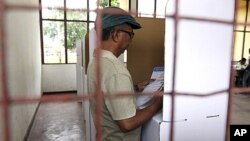Citizens of East Timor, one of the world’s newest and poorest nations, headed to the polls Saturday to vote for the country’s next president. On the brink of civil war in 2006, the country has achieved a measure of political stability over recent years. This year’s campaign period has been markedly peaceful, but the election is a key test for the impoverished, yet oil-rich nation.
East Timorese are choosing a president for just the second time since the country was granted independence in 2002.
The election is shaping up to be a three-way race between incumbent and Nobel Prize winner Jose Ramos Horta, Francisco "Lu Olo" Guterres from the Fretilin Party, and former military chief Taur Matan Ruak.
At a polling station in Dili, Charlie Sheiner, an analyst from the Timor-Leste Institute for Development Monitoring and Analysis, says the day’s turnout and relatively peaceful campaign period highlight the growing maturity of East Timor’s democracy.
“I think the election cycle this year indicates that from a process of democracy or a country under rule of law, Timor Leste is becoming normal," he said. "The fact that the campaign was relatively free of incidents, and that the voting today seems to be going smoothly, indicates that people have in their day-to-day work made the transition from living under a military occupation, or under a colonial occupation for centuries, to be able to decide their own future, choose their own leaders [and] set the course of their own nation.”
Since the brutal occupation by Indonesia and the brush with civil war in 2006, East Timor has enjoyed a measure of political security.
If this month's presidential election and the upcoming parliamentary vote in June run smoothly, the contingent of U.N. and Australian troops is scheduled to pull out of the country by the end of the year.
East Timor is often described as ''an impoverished country with a very large bank account.” Ninety percent of East Timor’s gross domestic product is derived from oil and gas.
But with almost half of the population living below the poverty line, how the government spends that revenue will be crucial to the country’s development.
Charlie Scheiner says that right now the country can live with a billion-dollar trade deficit, but it's time for money to be spent on developing health, education and infrastructure.
"The two oil fields that are in production now will be dry in about 12 years," said the analyst. "So when the kids who are walking around the street now, when they are old enough to vote, there won’t be any more oil money. And we think that there's a very important change of direction that needs to happen pretty soon to use the oil money to develop the rest of the economy."
Back at the polling booth, Josh Trindad, who is part of the campaign for former military chief Taur Matan Ruak, says it is time for East Timor to prove it can look after itself.
"Timorese have to stand up and fix the country’s problems by themselves," said Trindad. "We cannot keep relying on internationals. Although at the moment we are struggling ... I think we are very optimistic about our future. Why? We are only one million population and we have some natural resources. So the future we are very optimistic about it. It is just a matter of getting ourselves together and getting there.”
Twelve candidates are contesting the presidency this year, but in a country with no public opinion polls, the results are hard to predict.
The results will be officially released next week. Analysts expect the voting will go to a second round next month.
News
Peaceful Elections a Symbol of Timor’s Maturing Democracy
- By Kate Lamb







